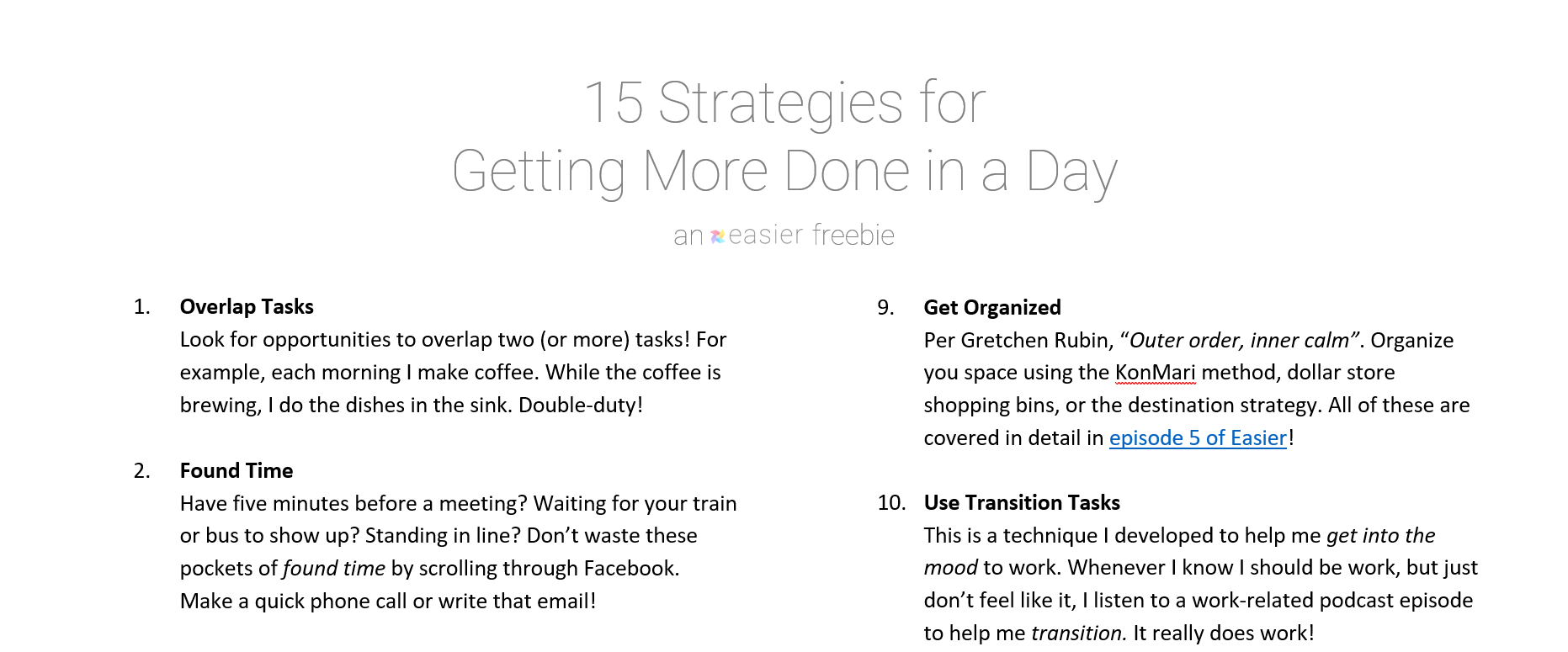Table of Contents
The Four Tendencies
Make Life Easier
This week, we’re talking about The Four Tendencies by Gretchen Rubin. It’s a phenomenal framework for thinking about people and personalities!
One of my digital mentors, Gretchen Rubin

Gretchen Rubin is a happiness researcher and podcast host living in New York City.
She’s the host of the podcast Happier with Gretchen Rubin (my favorite podcast!), as well as the author of a number of books. This includes one of her latest books The Four Tendencies, which we’re talking about this week!
What are The Four Tendencies?
- The Four Tendencies are Gretchen Rubin’s framework for how folks deal with expectations
- Looks at whether inner and outer expectations are met or resisted
- Only describes expectations (and not other facets of life)
- They are: Upholder, Questioner, Obliger, and Rebel
1. Upholder: Meets outer & inner expectations
19% of people
Discipline is my freedom.
- Strengths
- Someone who does the things they’ve said they would
- Sticks to deadlines
- Self-motivated & self-starter
- Reliable & thorough
- Weaknesses
- Someone who can be inflexible & rigid
- Seen as uptight
- Impatient with folks who don’t meet outer expectations
- Dealing with
- They get things done
- They can be counted on
- Sometimes need to be reminded that others don’t always meet expectations like they do
- May have trouble delegating
2. Questioner: Resists outer & meets inner expectations
24% of people
I’ll comply — if you convince me why.
- Strengths
- Efficiency & effectiveness are key
- Data-driven
- Rejects doing things because that’s the way they’ve always been done
- Fair minded because they weigh the evidence
- Weaknesses
- Over-questioning can lead to analysis-paralysis
- Don’t like being questioned themselves
- Impatient with others, especially folks who don’t simply accept their reasoning
- Dealing with
- Bring data, reason, and research
- Remember that it’s in their nature to ask lots of questions. It’s usually not meant to be uncooperative.
- They hate anything arbitrary
- They resist tradition for the sake of tradition (because that’s the way we’ve always done it will most likely be met with So what? Why?)
3. Obliger: Meets outer & resists inner expectations
41% of people (largest group)
You can count on me, and I’m counting on you to count on me.
- Strengths
- Works well in teams
- Readily gets things done for others
- Seen as responsible
- Weaknesses
- Can easily get burned out if too much is expected
- Exploitable if without boundaries (e.g., a boss who demands too much)
- Overwork can lead to obliger-rebellion
- Dealing with
- External accountability is huge! A spouse, relative, partner, or group can be the key.
- They need deadlines
- Others sometimes see their need for external accountability as weakness. It’s not! It’s just the way they are. Learn to use this as an advantage.
- Don’t expect too much. When overworked, they can rebel.
4. Rebel: Resists outer & inner expectations
17% of people / Smallest group
You can’t make me, and neither can I.
- Strengths
- Independent
- Will ditch norms
- Creative / out-of-the-box thinking
- Good understanding of themselves
- Weaknesses
- Can be uncooperative / inconsiderate
- Consistency can be an issue
- So can routines and planning
- Can be restless
- Dealing with
- They value choice, integrity, identity
- They’ll naturally resist things that are asked of them
- Appeal to sense of identity: Good parents do X. If they see themselves as a good parent, they’ll comply.
- Good at delegating
Discover your tendency
- If you’re curious about your tendency, take Gretchen Rubin’s quiz!
- You can find it by clicking here
What’s my tendency?
- Based on this podcast alone, it’s pretty obvious that I’m a Questioner
- I love to… well… ask questions!
- Optimization and data are my favorite!
- I tend to tip toward upholder, but I can occasionally tip a bit toward rebel too
How to use this framework: Some additional resources
- Take the quiz
- Grab the flash evaluation & start working out others’ tendencies (you’ll need to scroll down and click the link)
- Read the book!
- Listen to the episodes of Happier, her podcast, where she talks about the tendencies:
Google Search Hacks
Make Work Easier
In the spirit of my Questioner tendency, I thought I’d share a quick life hack for better Google searches:
1. Exact match
Put your search in quotes to force google to search for that exact phrase.
- Tallest building vs. “Tallest building in Chicago”
2. Eliminate keywords
If you’re getting results you don’t want, try eliminating keywords using the minus sign (-).
- Keto pizza vs. Keto pizza -cauliflower (eliminates results with “cauliflower”)
- Apple vs. Apple -fruit (eliminates “fruit”, likely forcing Google to focus on Apple the company)
3. Require keywords
If you want to guarantee that a specific keyword is in your results, add a plus sign (+)
- Keto pizza vs. Keto pizza +cauliflower (all search results will have “cauliflower” in them)
- Apple vs. Apple +fruit (search results will have “fruit” in them)
Get the Free Download!
15 Strategies for Getting More Done in a Day
I have a fantastic freebie I'd love to send to you. It's a one-page guide that covers my favorite 15 strategies for making the most out of every day.
Click below to grab this download now!



